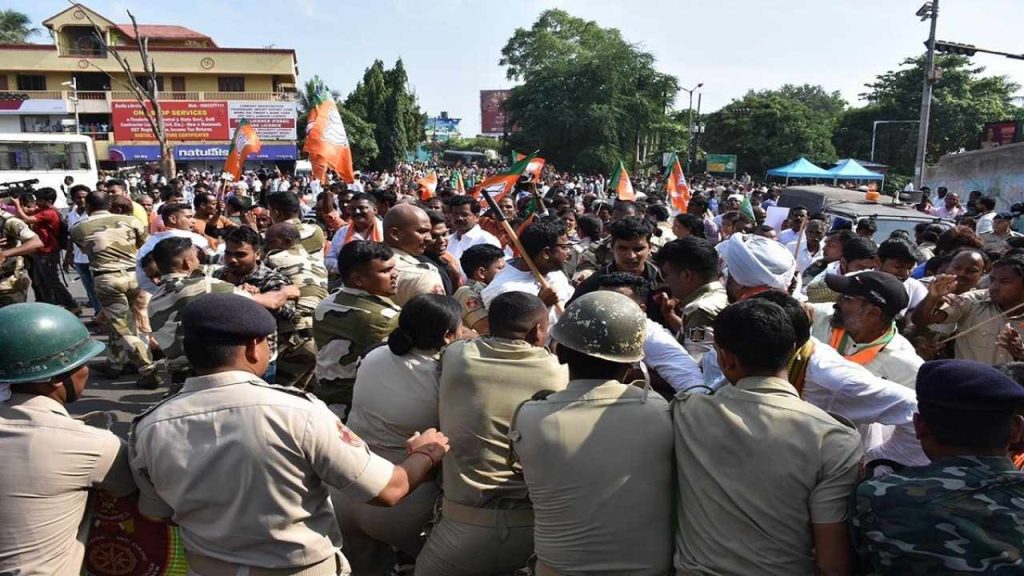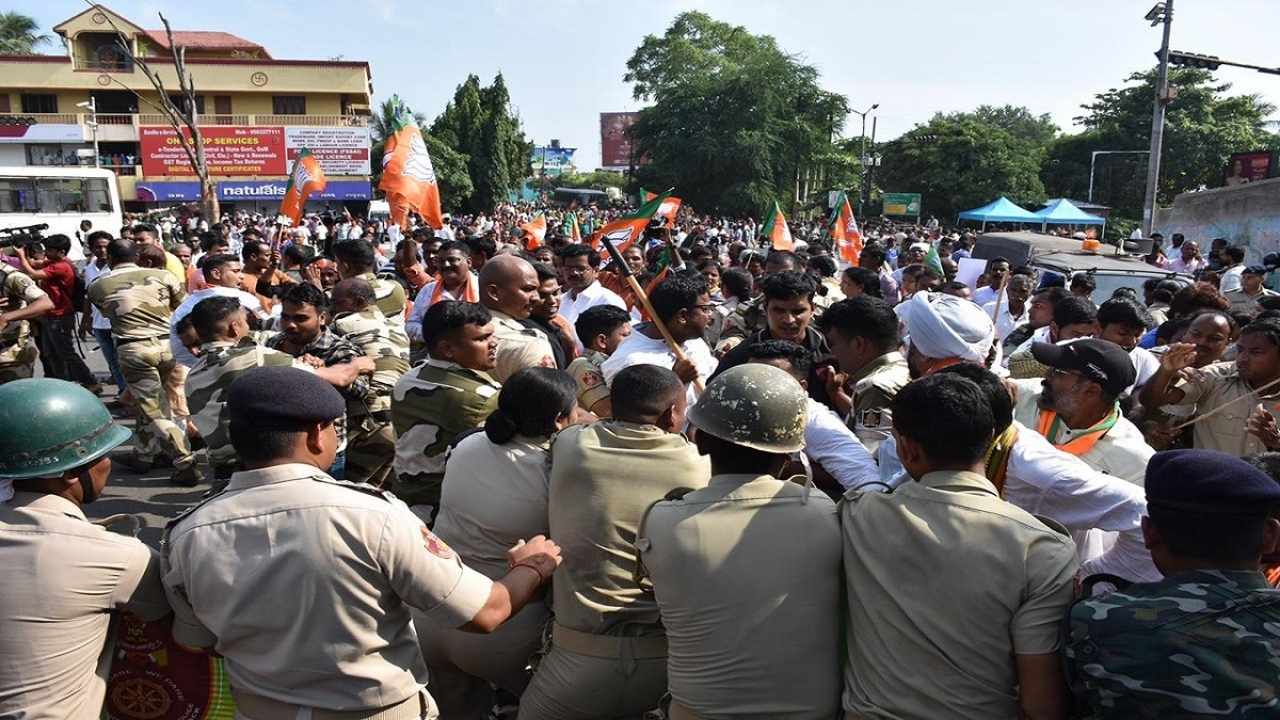In recent political developments, the Bharatiya Janata Party (BJP) in Odisha has raised serious concerns about the opposition’s credibility when it comes to addressing women’s issues. The BJP’s statements reflect a growing tension between the ruling party and opposition leaders, particularly in light of a tragic incident involving the self-immolation of a 20-year-old student from Fakir Mohan College in Balasore. The student’s tragic death was allegedly linked to her complaints of sexual harassment by a faculty member. While opposition parties like the Congress and the ruling Biju Janata Dal (BJD) have staged protests, the BJP has vehemently accused them of lacking the moral high ground to speak on women’s safety.

This article will dive into the key points surrounding the BJP’s assertion that the opposition has no moral authority to raise women’s issues. We’ll provide context, key facts, and practical insights to help readers understand the political dynamics and implications of this debate.
Odisha BJP Asserts Opposition Lacks Moral
| Key Data/Information | Details |
|---|---|
| Incident | 20-year-old student from Fakir Mohan College in Balasore set herself on fire after alleging harassment. |
| Date of Incident | July 2025 |
| Parties Involved | BJP, Congress, BJD |
| BJP’s Stand | The BJP accuses the opposition of politicizing the tragedy. |
| Opposition’s Response | Congress and BJD criticize the BJP for mishandling the case and demand accountability. |
| Key Figures | Aparajita Sarangi (BJP spokesperson), Rahul Gandhi (Congress MP), Naveen Patnaik (BJD leader) |
| Key Source | New Indian Express, ABP News |
The BJP’s claims that the opposition lacks the moral authority to speak on women’s issues have sparked a fiery debate in Odisha. Both sides—ruling and opposition—have valid points, but the tragedy of the student’s death is a reminder of the urgent need for systemic reform. Whether it’s through better enforcement of existing laws or a shift in political priorities, Odisha must confront the challenges surrounding women’s safety head-on. As citizens, understanding the dynamics at play allows us to make informed choices about political accountability and our collective responsibility to protect women.
The Incident and Its Aftermath
On a fateful day in July 2025, a 20-year-old student from Fakir Mohan College in Balasore tragically set herself on fire. The act was allegedly a desperate response to repeated inaction over her sexual harassment complaint against a faculty member. The incident shook the local community, prompting outrage and widespread condemnation. The student’s death has sparked intense political reactions, particularly from the Congress and BJD, who have accused the BJP-led government in Odisha of mishandling the case.
In response, the BJP has pushed back, accusing the opposition parties of using the tragedy to score political points rather than addressing the root causes of women’s safety and harassment. This has led to a heated debate about the political accountability of the ruling party and opposition, particularly in the realm of women’s rights.
BJP’s Accusation: Lack of Moral Authority
The BJP has been vocal in asserting that opposition parties, particularly Congress and BJD, have no moral authority to speak on issues related to women’s safety. The party argues that for decades, these parties held power without making substantial changes to improve the safety of women in the state. BJP spokesperson Aparajita Sarangi specifically pointed out the hypocrisy in the opposition’s sudden concern for women’s rights when their track record is far from commendable.
Sarangi emphasized that during the BJP’s tenure under Chief Minister Mohan Charan Majhi, swift actions were taken after the incident. Within 24 hours, the accused faculty member was arrested, and the Chief Minister visited the victim multiple times during her treatment at AIIMS-Bhubaneswar. The BJP insists that the opposition’s protests are nothing more than an opportunistic move, especially since their previous record on women’s safety has been lackluster at best.
A Historical Context of Women’s Safety in Odisha
The political discourse surrounding women’s safety in Odisha isn’t new. Over the years, the state has witnessed several incidents of gender-based violence, with varying degrees of governmental response. The opposition parties have, at times, been criticized for their insufficient measures to protect women. This backdrop of political failure plays a key role in the BJP’s argument that the opposition’s sudden outrage over this specific case is both disingenuous and politically motivated.
During the Congress’s reign in Odisha, the state struggled with a number of high-profile incidents of sexual violence, and despite numerous promises of reforms, the implementation was often criticized as being slow or ineffective. The BJD, while in power for several decades, also faced similar criticisms during its tenure. The BJP argues that these historical failures undermine the opposition’s current stance on women’s rights.

Opposition’s Reactions: Calling for Accountability
In stark contrast to the BJP’s stance, opposition leaders like Rahul Gandhi and Naveen Patnaik have heavily criticized the state government’s handling of the case. The Congress, particularly, has demanded accountability and has pointed to what it sees as systemic failures in the government’s response to the student’s harassment complaint. Rahul Gandhi, in particular, has been vocal in blaming the BJP for creating an environment in which such incidents could occur and go unchecked.
The BJD, too, has called for a judicial inquiry into the incident, with party workers clashing with police during protests demanding justice. While the BJD is technically an ally of the BJP in some ways, their criticism of the BJP in this context reflects the ongoing rivalry and the contentious nature of regional politics in Odisha.
Practical Advice for Understanding the Situation
1. Understanding Political Accountability
Political accountability is a crucial part of a democratic system. In the case of Odisha, it’s important to evaluate how different parties have addressed women’s safety over time. While it’s easy to point fingers after a tragedy, a thorough assessment of each party’s actions in the past can provide a clearer picture of who has truly worked to improve conditions for women.
Example: The BJP, for instance, may be lauded for quickly arresting the accused faculty member, but critics argue that such actions should have been routine, not a rare occurrence. Likewise, while the opposition is quick to criticize, their own records need to be scrutinized for long-term solutions rather than just reacting to the current incident.
2. Legal and Institutional Frameworks
Understanding the legal frameworks that govern women’s rights and safety is essential. In India, the Protection of Women from Sexual Harassment at Workplace Act (2013) is one such law that aims to protect women in educational institutions and workplaces from harassment. Evaluating how effectively these laws have been enforced in Odisha under different administrations can shed light on the state’s overall progress in this area.
3. Voices of the People
The voices of the people, particularly women who have faced violence and harassment, offer important insights into the effectiveness of political leaders. Listening to the lived experiences of survivors can guide policy and institutional reforms more effectively than partisan bickering.
Odisha Govt Adds Abetment of Suicide Charges in FM College Student Death Case
Odisha Government Takes Action Against Inefficiency with Forced Retirements
Odisha Implements Policy to Prevent High-Risk Prisoners from Attending Court in Person
FAQs
What happened to the student from Fakir Mohan College?
The student set herself on fire in July 2025, allegedly due to repeated inaction on her sexual harassment complaint against a faculty member. She later succumbed to her injuries, sparking political protests.
What is the BJP’s stance on the issue?
The BJP accuses the opposition of politicizing the tragedy and points out that their historical governance has been ineffective in addressing women’s safety. The party highlights the swift actions taken by the BJP government after the incident.
What do the opposition parties say?
Congress and BJD have condemned the handling of the case by the BJP-led government and have called for accountability. They also demand a judicial probe into the incident.
How has Odisha addressed women’s safety in the past?
Women’s safety in Odisha has been a matter of concern, with both the Congress and BJD governments being criticized for their slow responses to gender-based violence. The BJP, despite its recent efforts, has faced similar criticisms.





